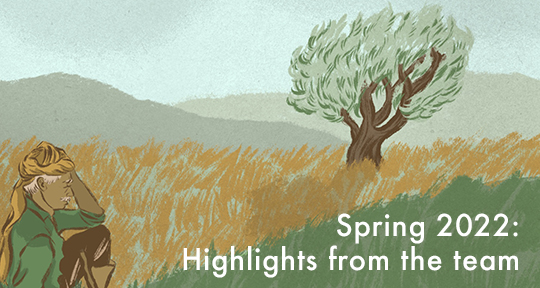Last week’s Paris 2024 Olympics Opening Ceremony featured numerous nods to literature, art, and music, calling to mind Georgi Gospodinov’s statement in his interview for our Summer 2024 issue: “Culture is a continuous conversation, a hum of different voices, and it’s actually wonderful music, a sort of polyphony. We are not only immersed in that conversation, we are also part of it.” Indeed, as our very own Mary Hillis points out, this brand-new Summer edition is a “veritable parade of nations with works from 35 countries.” Read on to discover some of the highlights, courtesy of our multicontinental crew!
My favorite in this issue is Honora Spicer’s Spitting Sutures, with its mesmerizing fluid interplay of drafting a translation, selling a house, and experiences of the body. Fluidity also defines Olivia Sears’s in-depth historical exploration of Italian Futurist Ardengo Soffici in a conversation with Eugene Ostashevsky. Krzysztof Umiński’s Three Translators (tr. Soren Gauger) is also a wonderfully detailed dip into translation history, this time Polish. Two other texts I really enjoyed were Farah Ahamed’s The Day You Ate our Deliveroo Delivery and the dramatic excerpt Trinity by Hamid Ismailov (tr. Shelley Fairweather-Vega), the first for its many-faceted examination of an ethical confrontation, the second for its gorgeously translated insults and imprecations.
—Ellen Elias-Bursać, Contributing Editor
I love the compact, compressed nature of Adelheid Duvanel’s The Poet (tr. Tyler Schroeder). It’s got an amazing opening line that hooked me right away. The journey of the story that goes from childhood vignette to the awareness of the narrator as poet is really striking, showing how transformative and creative language can be, how altering a shift in perspective can be.
Micaela Brinsley’s Nothing to Be Owed is such a unique piece of writing, hybridic in its tone and structure, lyrical and poetic prose. The reflections on care in italics intersperse beautifully what’s going on in the almost journal-like entries. The line “I’m trapped by the transactional” will stick with me for a while.
Sarah Gear’s conversation with Georgi Gospodinov (tr. Angela Rodel) is a huge interview for Asymptote and it was a privilege to get such intimate access to the Booker International Prize-winning author’s mind.
—Hilary Ilkay, Assistant Managing Editor READ MORE…






